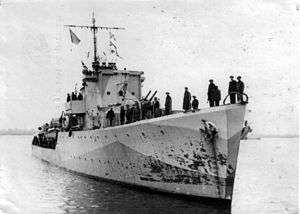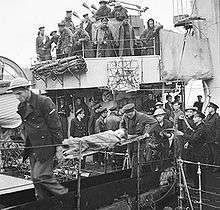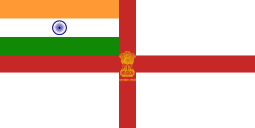ORP Ślązak (L26)
ORP Ślązak (Polish for Silesian) was a World War II Hunt-class destroyer. Initially laid down in 1940 for the Royal Navy as HMS Bedale, in 1942 she was commissioned by the Polish Navy.
 Ślązak returning home after the Dieppe Raid | |
| History | |
|---|---|
| Name: | HMS Bedale |
| Laid down: | 25 May 1940 |
| Launched: | 23 July 1941 |
| Name: | ORP Ślązak |
| Commissioned: | 17 April 1942 |
| Decommissioned: | 28 September 1946 |
| Identification: | Pennant number: L26 |
| Name: | INS Godavari |
| Acquired: | April 1959 |
| Commissioned: | 27 April 1953 |
| Out of service: | 1976, after running ashore in the Maldives |
| Identification: | Pennant number: D92 |
| Fate: | scrapped in 1979 |
| General characteristics | |
| Class and type: | Hunt-class destroyer |
| Displacement: |
|
| Length: | 85.3 m (280 ft) |
| Beam: | 9.6 m (31 ft) |
| Draught: | 2.4 m (7 ft 10 in)/3.9 m (13 ft) |
| Speed: | 27 kn (50 km/h; 31 mph) |
| Range: |
|
| Complement: | 160 |
| Armament: |
|
| Notes: | powered by 2 shaft steam turbines 19,000 hp (14,200 kW) |

After World War II, she was leased to the Indian Navy in 1953, where she served as a training ship until 1976. She was scrapped in 1979.
History as ORP Slazak
Ślazak was commissioned on 17 April 1942. During the Second World War she took part in 32 patrols and escorted 104 convoys.[1] Ślązak was one of eight Hunt-class ships that took part in the Dieppe Raid.[2] At Dieppe she saved 85 soldiers of the Royal Regiment of Canada, trapped at the beach after landing.[3] During the invasion of Normandy she was supporting the landing at Sword. She was the lead destroyer for the lead flotilla of minesweepers that morning, which was symbolic because the invasion of Poland by German forces had initiated the conflict.[4] As a convoy escort her crew shot down five enemy aircraft (and possibly three more).
After the war she was decommissioned in 1946 and transferred back to the Royal Navy.
History as INS Godavari
HMS Bedale was leased to the Indian Navy in 1952. She underwent a refit by the Cammell Laird shipyard at Birkenhead, and was commissioned as INS Godavari on 27 April 1953. In April 1959, the lease was converted into a sale. Along with INS Gomati and INS Ganga she formed part of the 22nd Destroyer squadron.[5]
She served as a training ship until 23 March 1976 when she ran aground in the Maldives and was damaged beyond repair.[6] INS Godavari was eventually scrapped in 1979.[7]
References
- Kozłowski, Wiszenko: ORP Ślązak L26, polishgreatness.com
- Stacey, Colonel C.P. (1967) [1955]. Six Years of War; The Army in Canada, Britain and the Pacific. Official History of the Canadian Army in the Second World War. 1. Ottawa: Queen's Printer. p. 345.
- STEPHEN HUEBL: CPT. ROMUALD NALECZ TYMINSKI - Polish Canadian, 1905–2003, stefanbatoryoceanliner.weebly.com
- Ambrose, Stephen E. (1994). D-Day June 6, 1944 the climactic battle of World War II (Hardback. ed.). New York [u.a.]: Simon and Schuster. p. 256. ISBN 978-0-671-67334-5.
- Blackman, Raymond V B, Jane's Fighting Ships 1963-4, Sampson Low, Marston & Co. Ltd, London, p123
- Hiranandani, G. M. (2005). Transition to Eminence: The Indian Navy 1976–1990. Lancer Publishers, p. 22. ISBN 81-7062-266-2
- "HMS Bedale". Naval History website. Retrieved 9 August 2011.
Publications
- Colledge, J. J.; Warlow, Ben (2006) [1969]. Ships of the Royal Navy: The Complete Record of all Fighting Ships of the Royal Navy (Rev. ed.). London: Chatham Publishing. ISBN 978-1-86176-281-8.
- English, John (1987). The Hunts: a history of the design, development and careers of the 86 destroyers of this class built for the Royal and Allied Navies during World War II. England: World Ship Society. ISBN 0-905617-44-4.
